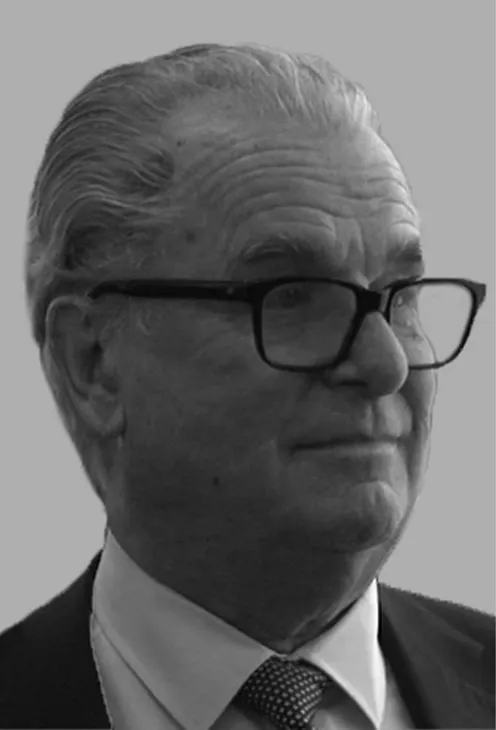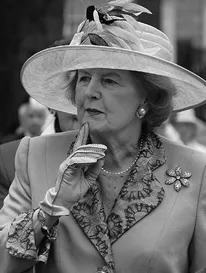![]()
Part One
Old school, robust media battles but with leadership, strategy and innovation
![]()
Lord Bell, 2015
Source Gavin Ellwood, Ellwood Atfield’s gallery event, 24 March 2015 ‘How to Win (or Lose) an Election’
Chapter One
Labour Isn’t Working
The election of Margaret Thatcher – 1978–1979
Introduction
From a marketing and media perspective, Margaret Thatcher was the first truly modern British political leader and prime minister. Although she was prime minister for 11 years thanks to three general election victories, it was her 1979 election campaign that was the most groundbreaking. Moreover, it set the tone for her premiership and legacy.
Why the campaign shook the world
This campaign produced Britain’s first (and so far, only) female prime minister. In 1979, when Margaret Thatcher was first elected, the swing away from the incumbent Labour government was 5.1 per cent, the greatest since Labour’s Clement Attlee beat Winston Churchill at the end of World War Two.
It was to produce a startlingly new type of Conservative government: Thatcher was the first Conservative prime minister to come from outside the British ‘establishment’. She offered genuine aspirational appeal to both Britain’s middle and working classes. Significantly, her comms team comprised similarly non-establishment figures.
Thatcher went on to win the two subsequent elections (1983, 1987) on the same basic ticket. Lord Bell claims that Thatcher’s election in 1979 ‘brought about the end of socialism, as we knew it, in Britain’. This may be somewhat hyperbolic but it is certainly true that Thatcher’s leadership converted many in the opposition Labour movement into accepting the market dynamics of capitalism (and ultimately led to Tony Blair’s ‘Clause IV moment’ – see Chapter 2).
Why is the campaign great?
This can claim to be Britain’s first modern political campaign. Political communications was still a relatively new discipline in the 1970s. The 1960s had seen the end of the age of deference, from the media and public, towards the country’s leaders. The proliferation of television sets with colour pictures in the mass market had led to rapid growth in the advertising industry. An increasingly pluralistic society encouraged a more open battle of ideas via the media and political system, which in turn encouraged rapid growth in the British PR industry.
Thatcher’s election campaign openly embraced the brand marketing principles of the Mad Men era. It was innovative in applying visual, impactful advertising power to a British politician. As such the messages to the electorate were more emotional and populist than rational and highbrow. It was also the first highly-integrated political campaign, with the advertising and editorial communications knitted closely together under a single team.
The cast
Margaret Thatcher (1925–2013) – later Lady Thatcher
One of history’s best-known and most controversial political figures. She was one of the few British prime ministers to have had a political movement named after them – ‘Thatcherism’. The woman herself was an unusual blend of middle-class upbringing (a grocer’s daughter from a market town in Lincolnshire, England), elite education (she read science at Oxford) and yet with a passion for many aristocratic institutions (the Monarchy, House of Lords). She was driven, focused and acutely aware of the need to communicate her vision in terms that the British public understood.
Baroness Margaret Thatcher, 2005
Source Allan House
Gordon Reece (1929–2001), director of publicity – later Sir Gordon Reece
Dapper and flamboyant in his style and lifestyle, Reece had been to a Catholic school and read law at Cambridge University but then decided to become a newspaper journalist. He later moved into television working on This is Your Life and Emergency Ward 10. Reece became close to the key newspaper editors of the 1970s including David English of the Daily Mail and Larry Lamb (the first editor of The Sun under its new owner, Rupert Murdoch). Reece met Thatcher when she was Shadow Education Secretary in the early 70s, when he was commissioned as a freelancer to produce a party political broadcast. Then during Thatcher’s leadership campaign Reece made a famous promotional film of her carrying out domestic chores such as washing the dishes. After she had won the leadership, Thatcher made Reece her full-time adviser. He later went on to work with PR agency boss Peter Chadlington (later Lord Chadlington) on various City takeover deals.
Tim Bell, chief advertising executive and key adviser – later Lord Bell
Bell was managing director of the Conservative Party’s advertising agency Saatchi & Saatchi. He was to become Thatcher’s personal adviser and ultimately one of her closest friends and confidants (see Campaign Star on p 13).
Other agency advisers from Saatchi & Saatchi
Margaret Thatcher actually had very few strategic political advisers in opposition, preferring to rely on external consultants. As well as Bell, this included the agency’s co-founders Maurice and Charles Saatchi, creative director and key copywriter Jeremy Sinclair and account director Bill Muirhead. All continue to be involved in the agency that emerged from Saatchi & Saatchi in the 1990s, M&C Saatchi.
Ronald Millar (1919–1998), chief speechwriter
‘Ronnie’ Millar was Margaret Thatcher’s main speechwriter from 1973 onwards. He was a former playwright and actor. Many of his speeches and lines went down in the political lexicon such as the famous statement: ‘You turn if you want to. The lady’s not for turning’ which was a dual pun responding to accusations of making U-turns in policy and on the 1948 play The Lady’s Not for Burning by Christopher Fry.
Party chairmen
These included Peter Thorneycroft (old-fashioned Etonian who was chairman during the 1978/79 election campaign and the man who originally agreed to hire Saatchi & Saatchi). He was later replaced by John Gummer, then by Chris Lawson (from Mars Petfoods), then Peter Brookes, then Norman Tebbitt.
Chris Patten, head of research – later Lord Patten
Patten, who was the party’s head of research during the 1978/79 election campaign, went on to be secretary of state for education, governor of Hong Kong and chairman of the BBC Trust.
★ THE CAMPAIGN STAR ★
Tim Bell
Tim Bell may not have been directly employed by Margaret Thatcher during her crucial 1979 election campaign – he was the managing director of the Conservative Party’s newly-hired ad agency Saatchi & Saatchi at the time – but he was nevertheless the pivotal figure and the one most trusted by Thatcher.
Born in 1941, Bell was a relatively youthful advertising executive at the time. Inspired by Thatcher and fiercely loyal, he was to learn quickly and soon became an adept and influential adviser. Despite being an ‘ad man’ in the early days, Bell also grasped the wider editorial process and forged strong relationships with key journalists and media owners. He realized he had an instinctive feel for how a narrative would play out in the short and long term.
Bell worked on all Thatcher’s election campaigns but always as a consultant and via a number of different firms. He went on to set up his own agency, Bell Pottinger, with Piers Pottinger, which continues to be one of the UK’s largest PR consultancies.
Bell is almost as divisive a figure in the comms business as his mentor Lady Thatcher was in the political world. He is forthright in his right-wing, libertarian views, which continue to offend many. This free-market approach has also extended to his consultancy work for politicians around the world, sometimes with questionable records on human rights.
Despite his controversial career which has included a selection of minor scandals, Bell inspires affection and loyalty among his clients and staff. Speak to alumni of Bell Pottinger and they talk of a man who always has time to advise on careers or help out with personal problems.
In person Bell is ever warm, charming and polite. Despite his political dogmatism he is lively company and a better listener than he gets credit for. He is also self-deprecating and candid once he trusts you. Surprisingly he has friends across the political spectrum.
In his 2014 memoirs Right or Wrong, Bell writes:
Margaret was an outsider – by sex, by upbringing, even in her largely non-collegiate approach – and in many ways she remained an outsider for many in the Tory Party. I was also an outsider; not public school, not even university. Certainly not establishment. In fact, I’ve been an outsider all my life and I’ve liked being so. When I started working for the Conservative Party (1978) I was an outsider because I came from the advertising industry – which to politicians in the 70s seemed like the rock music industry with added insanity. But I understood their world far better than they understood mine.
Despite starting as an outsider, Bell is now a life peer in the House of Lords, hugely wealthy and a genuine giant of the global PR industry. In his mid-70s he continues to go to the office every day, remains an all-round enthusiast and says h...


